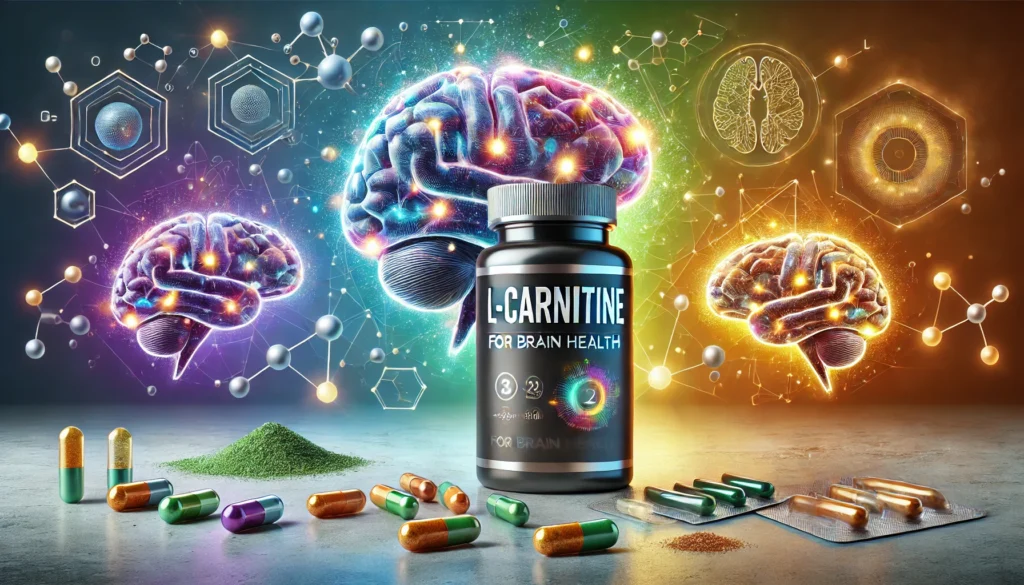L-Carnitine is an amino acid derivative naturally produced in the human body and sourced from various foods. It is essential for transporting long-chain fatty acids into the mitochondria, where they are oxidized to produce energy. Although best known for its role in energy metabolism and physical performance, L-Carnitine has garnered attention for its potential nootropic benefits. These include improved cognitive function, neuroprotection, and mood enhancement.
This article delves into the sources, chemistry, physiological mechanisms, cognitive benefits, and safety profile of L-Carnitine, providing a comprehensive overview of its use as a nootropic supplement. The article also outlines dosing recommendations, potential side effects, and risks of interactions with medications and other supplements.
You May Also Like:
L-Carnitine: Potential Nootropic Benefits, Dosage, Side Effects, Interactions, and Other Important Information About This Supplement is an original (NootropicsPlanet) article.
Sources of L-Carnitine
Dietary Sources
L-Carnitine is naturally present in many foods, particularly animal products:
- Red Meat: Beef and lamb are the richest dietary sources of L-Carnitine, providing 56–162 mg per 100 grams of meat.
- Poultry and Fish: Chicken, turkey, cod, and salmon provide moderate levels of L-Carnitine.
- Dairy Products: Milk and cheese contain small amounts of L-Carnitine.
- Plant-Based Foods: Avocados, asparagus, and whole grains contain trace amounts, making them less reliable sources for vegetarians and vegans.
Endogenous Production
The body synthesizes L-Carnitine from the amino acids lysine and methionine, with the process requiring adequate levels of vitamin C, iron, vitamin B6, and niacin. However, individuals with deficiencies in these nutrients or increased metabolic demands may benefit from supplementation.
Supplementation
L-Carnitine supplements are widely available in several forms:
- L-Carnitine: The standard form used for general metabolic support.
- Acetyl-L-Carnitine (ALCAR): A form that crosses the blood-brain barrier more effectively, offering targeted cognitive benefits.
- Propionyl-L-Carnitine (PLCAR): Often used for cardiovascular and circulatory support.

Chemistry of L-Carnitine
L-Carnitine, chemically known as (R)-3-hydroxy-4-(trimethylammonio)butanoate, is a water-soluble quaternary ammonium compound. Its unique chemical structure includes both polar and nonpolar regions, allowing it to interact with fatty acids and mitochondrial membranes.
- Zwitterionic Properties: L-Carnitine exists as a zwitterion at physiological pH, enhancing its solubility and stability in biological systems.
- Acetyl-L-Carnitine (ALCAR): A derivative of L-Carnitine, ALCAR contains an acetyl group that facilitates its entry into the brain and supports acetylcholine production, a neurotransmitter critical for cognitive functions.
These properties make L-Carnitine a versatile compound with wide-ranging applications in cellular metabolism and brain health.
Physiological Mechanisms of L-Carnitine in the Body and Brain
1. Fatty Acid Transport and Energy Production
The primary role of L-Carnitine is to transport long-chain fatty acids into the mitochondria, where they undergo beta-oxidation to produce ATP. This process is essential for maintaining energy homeostasis, particularly in energy-demanding tissues like the brain, heart, and muscles. Without sufficient L-Carnitine, fatty acid metabolism is impaired, leading to reduced energy availability and the accumulation of unoxidized lipids, which can negatively impact cellular health. This energy-boosting function is especially critical during periods of physical exertion or mental strain, where energy demands are heightened.
2. Acetylcholine Synthesis
Acetyl-L-Carnitine donates acetyl groups for the synthesis of acetylcholine, a neurotransmitter vital for learning, memory, and attention. By supporting acetylcholine levels, ALCAR enhances synaptic activity and neural communication. This action is particularly beneficial for preserving cognitive functions as individuals age, helping to combat age-related memory decline. Furthermore, acetylcholine is critical for neural plasticity, the brain’s ability to adapt and reorganize, making ALCAR a potential tool for cognitive rehabilitation after injury or disease.
3. Mitochondrial Protection
L-Carnitine stabilizes mitochondrial membranes and reduces the production of reactive oxygen species (ROS), protecting cells from oxidative damage. This mechanism is particularly important in the brain, where mitochondrial dysfunction is a hallmark of neurodegenerative diseases. By preserving mitochondrial integrity, L-Carnitine not only prevents cell death but also improves energy efficiency, which is crucial for maintaining neuronal health. This protective effect may also extend to preventing cognitive decline associated with chronic conditions such as diabetes and cardiovascular disease.
4. Neurotransmitter Regulation
L-Carnitine modulates neurotransmitter systems, including dopamine and serotonin, which are critical for mood regulation and cognitive performance. This action makes it a promising therapeutic option for mood disorders and stress-related cognitive impairments. By optimizing the balance of these neurotransmitters, L-Carnitine may alleviate symptoms of depression and anxiety, improving overall mental resilience. Additionally, these regulatory effects can enhance focus and motivation, further solidifying its potential as a nootropic supplement.
5. Anti-Inflammatory Effects
Research suggests that L-Carnitine reduces pro-inflammatory markers in the brain, mitigating inflammation that contributes to cognitive decline and neurodegeneration. Chronic inflammation in the brain is associated with various disorders, including Alzheimer’s disease and depression, making L-Carnitine’s anti-inflammatory properties particularly valuable. By curbing inflammation, L-Carnitine supports a healthier neural environment, which is essential for maintaining cognitive functions over the long term.

Nootropic Benefits of L-Carnitine
The potential nootropic benefits of L-Carnitine stem from its ability to enhance brain energy metabolism, protect neurons, and modulate neurotransmitter activity. Below are some of the key cognitive benefits:
1. Enhanced Energy Metabolism in the Brain
The brain consumes approximately 20% of the body’s energy at rest, making efficient ATP production critical for cognitive functions. By facilitating fatty acid oxidation, L-Carnitine ensures a steady supply of energy to neurons, supporting tasks like focus, problem-solving, and memory retention. This sustained energy supply is particularly beneficial for combating mental fatigue and enhancing cognitive performance during prolonged periods of intellectual effort.
2. Neuroprotective Effects
L-Carnitine protects against neuronal damage caused by oxidative stress and mitochondrial dysfunction. Its neuroprotective properties may delay the onset or progression of neurodegenerative diseases such as Alzheimer’s and Parkinson’s. By stabilizing mitochondrial membranes and reducing ROS, it enhances cellular resilience and promotes long-term brain health. Additionally, its ability to reduce inflammation in the brain further supports its role in preserving cognitive function as individuals age.
3. Improved Mood and Emotional Resilience
Acetyl-L-Carnitine’s ability to modulate serotonin and dopamine levels has been linked to reduced symptoms of depression, particularly in older adults. Clinical studies suggest that ALCAR may enhance emotional resilience, reduce stress, and improve overall mental well-being. These effects make it a valuable supplement for individuals experiencing mood disorders, especially those linked to chronic stress or age-related changes in neurotransmitter activity.
4. Enhanced Cognitive Clarity and Focus
L-Carnitine supports acetylcholine synthesis, which is essential for attention and mental clarity. This effect is particularly beneficial during periods of mental fatigue or high cognitive demand, such as studying or problem-solving. Furthermore, its role in optimizing brain energy production contributes to sharper focus and improved multitasking ability, making it an attractive option for individuals seeking to maximize cognitive output.
5. Recovery from Neurological Injuries
Preliminary research indicates that L-Carnitine may support recovery from traumatic brain injuries (TBIs) by reducing oxidative stress, promoting neurogenesis, and enhancing synaptic plasticity. Its ability to improve mitochondrial function and reduce inflammation in damaged neural tissue further accelerates the healing process, potentially improving outcomes in both acute and chronic stages of recovery.

Dosage and Supplementation Guidelines
General Dosage Recommendations
The optimal dosage of L-Carnitine varies depending on the form used and the desired outcome:
- General Metabolic Support: 500–2,000 mg per day of standard L-Carnitine.
- Cognitive Enhancement: 500–1,500 mg per day of Acetyl-L-Carnitine (ALCAR).
- Cardiovascular Health: 1,000–3,000 mg per day of Propionyl-L-Carnitine (PLCAR).
Specific Recommendations
- For Energy and Cognitive Benefits: Start with 500 mg of ALCAR, taken in the morning. Gradually increase to 1,500 mg if well-tolerated.
- For Recovery and Repair: Use higher doses (2,000–3,000 mg) under medical supervision, particularly for post-injury recovery or chronic conditions.
Timing and Absorption
L-Carnitine supplements are best taken on an empty stomach to maximize absorption. Dividing the daily dose into two or three smaller doses can enhance tolerability and maintain stable blood levels.
Side Effects and Safety
L-Carnitine is generally well-tolerated, but some individuals may experience mild side effects, particularly at higher doses:
Common Side Effects
- Gastrointestinal Distress: Nausea, diarrhea, and abdominal cramping may occur, especially with doses above 3,000 mg per day.
- Fishy Odor: High doses of L-Carnitine can lead to the production of trimethylamine (TMA), resulting in a fishy body odor. This effect is more likely in individuals with trimethylaminuria.
Rare Side Effects
- Insomnia or Restlessness: Some individuals may experience difficulty sleeping if L-Carnitine is taken late in the day.

Interactions with Other Supplements and Medications
Drug Interactions
- Anticoagulants: L-Carnitine may increase the risk of bleeding when combined with blood thinners like warfarin.
- Thyroid Hormones: L-Carnitine may reduce the absorption or effectiveness of thyroid medications, requiring monitoring in individuals with hypothyroidism.
- Valproic Acid: Patients on valproic acid for epilepsy may benefit from L-Carnitine supplementation to counteract drug-induced carnitine depletion.
Supplement Interactions
- Omega-3 Fatty Acids: Co-supplementation with omega-3s enhances mitochondrial function and reduces inflammation, amplifying the benefits of L-Carnitine.
- Cholinergic Nootropics: L-Carnitine pairs well with cholinergic compounds like citicoline or alpha-GPC, boosting cognitive effects through enhanced acetylcholine production.
- Antioxidants: Combining L-Carnitine with antioxidants like vitamin E or CoQ10 enhances its neuroprotective properties.
Risks for Individuals with Certain Health Conditions
While L-Carnitine is safe for most individuals, certain populations should exercise caution:
1. Kidney Disease
L-Carnitine supplementation may lead to an accumulation of metabolites like TMA in individuals with impaired kidney function, exacerbating symptoms.
2. Cardiovascular Disease
L-Carnitine metabolism produces trimethylamine-N-oxide (TMAO), a compound linked to cardiovascular risk. Individuals with heart disease should consult a healthcare provider before use.
3. Thyroid Disorders
L-Carnitine may interfere with thyroid hormone activity, particularly in individuals with hypothyroidism. Monitoring thyroid function during supplementation is recommended.
Conclusion: Should You Consider L-Carnitine as a Nootropic?
L-Carnitine offers a unique combination of benefits, from enhancing brain energy metabolism to protecting against oxidative stress and neurodegeneration. Its ability to support cognitive function, mood regulation, and recovery from neurological injuries makes it a promising nootropic supplement.
While L-Carnitine is generally safe, responsible use is essential. Consulting a healthcare provider before supplementation is advisable, particularly for individuals with pre-existing health conditions or those taking medications. With proper dosing and attention to safety, L-Carnitine can play a valuable role in optimizing brain health and overall well-being.

References:
- Health Benefits of L-Carnitine. Retrieved from: https://www.health.com/l-carnitine-benefits-8637833
- L-Carnitine: Benefits, Side Effects, Sources, and Dosage. Retrieved from: https://www.healthline.com/nutrition/l-carnitine
- L-Carnitine – Uses, Side Effects, and More. Retrieved from: https://www.webmd.com/vitamins/ai/ingredientmono-1026/l-carnitineL-Carnitine Benefits Endurance, Fat Burning and Brain Function. Retrieved from: https://draxe.com/nutrition/l-carnitine/
- L-Carnitine and acetyl-L-carnitine roles and neuroprotection in developing brain. Retrieved from: https://pmc.ncbi.nlm.nih.gov/articles/PMC5621476/
Important Note: The information contained in this article is for general informational purposes only, and should not be construed as health or medical advice, nor is it intended to diagnose, prevent, treat, or cure any disease or health condition. Before embarking on any diet, fitness regimen, or program of nutritional supplementation, it is advisable to consult your healthcare professional in order to determine its safety and probable efficacy in terms of your individual state of health.
Regarding Nutritional Supplements Or Other Non-Prescription Health Products: If any nutritional supplements or other non-prescription health products are mentioned in the foregoing article, any claims or statements made about them have not been evaluated by the U.S. Food and Drug Administration, and such nutritional supplements or other health products are not intended to diagnose, treat, cure, or prevent any disease.


